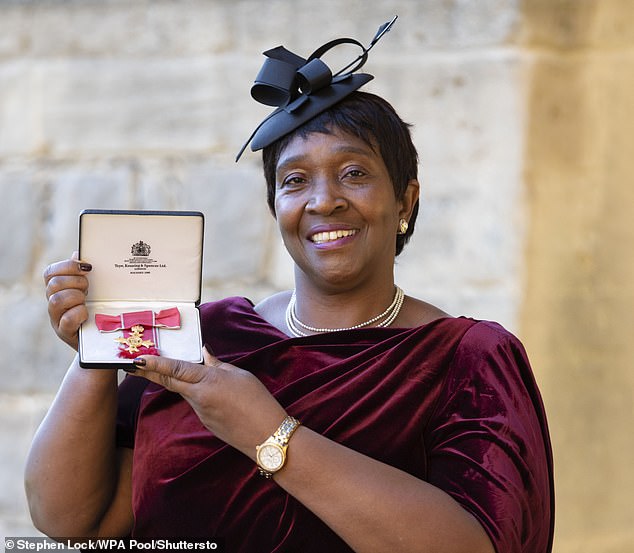A black judge has said she is regularly searched for weapons or banned items by security staff when she enters court.
Cordella Bart-Stewart, 67, has been a part-time immigration and asylum tribunal judge for 25 years.
She is one of seven black female judges on the steering committee of the UK Asscociation of Black Judges, which has been set up to support black judges and lawyers.
The number of black judges has remained at one per cent compared to 4.4 per cent of the working age population.
The group was created following a conference last year, where the judges discovered their treatment had been different to their white colleagues.
Bart-Stewart told The Times: ‘It’s not just the numbers — we often have to justify our existence, we hear colleagues muttering that we have filled some quota, sometimes we’re ignored and I’ve had problems getting into the building.’
When she sits in Birmingham’s court centre, Bart-Stewart says the security guard ‘will just insist on searching me’, even though judges are not supposed to be searched.
The judge, who was born in Jamaica, said a tribunal colleague once asked her if Jamaicans were ‘genetically predisposed to violence’.

Cordella Bart-Stewart, 67, has been a part-time immigration and asylum tribunal judge for 25 years
She added that ‘advocates are sometimes a bit huffy when they see you and I’ve had advocates who’ve assumed my clerk is the judge rather than me’.
Bart-Stewart said that as black judges retire, the already small number will be in danger of going backwards, as many black applicants are being turned away.
She said diversity efforts without meaningful outcomes are just’ leading to disappointment’.
She blamed attitudes towards race and class as well of the way judges are selected by the Judicial Appointments Commission.
She argued that judges are too involved in the appointment process and they should be removed from it entirely.
She said there was a tendancy for the judiciary to recruit in its own image and argued that artificial intelligence could design a fairer process.
She also called for an end of the ‘statutory consultation’ process which allowed judges who are not referees to provide feedback on applicants, which keeps alive the secret surroundings of the old appointment regime.
Bart-Stewart was born in Montego Bay, Jamaica, but her parents both moved to England when she was just six months old, leaving her with her grandmother.
Aged four, she too moved to the Birmingham to meet her parents and her brother, who had been born in England.
Her mother worked as a cleaner and her father did a factory job while he trained to become a mechanic.

The judge said she is often searched by security guards when she enters her court
They soon moved into a Victorian semi-deatched house and became the first black family on the street. She said in the 1960s black children were labelled as ‘educationally subnormal’ and were not taught.
She then attended a nearby state-run Hebrew school.
Inspired by the TV show Perry Mason, about a Los Angeles criminal defence lawyer and the American Civil rights movement, she decided she wanted to become a solicitor.
A careers officer told her it was not possible and that the best she could hope for was to manage a small supermarket.
Bart-Stewart refused to be put down and studied law at North Staffordshire Polytechnic — now Staffordshire University. She then completed her training in London.
In 1987 she qualified as a lawyer and launched her own firm Stewart & Co three years later. She remains a consultant at the firm today.
In 2000 she applied for a judicial post, after then Labour lord chancellor, Lord Irvine of Lairg, for more black lawyers to become judges, with the slogan ‘don’t be shy, apply’.
More than 20 years later, Bart-Stewart, who co-founded the Black Solicitors’ Network, was awarded an OBE for service to the legal profession and voluntary service to diversity and education.












